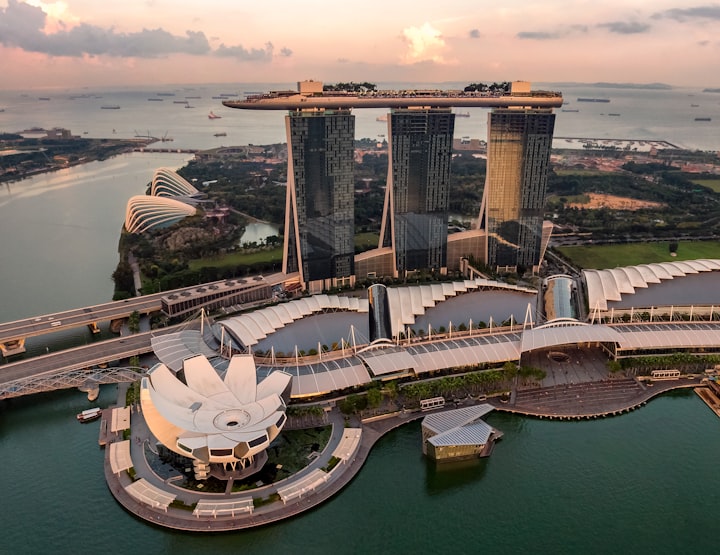Singapore: From Mythical Origins to Economic Powerhouse - A Fascinating Journey Through Time
Once upon a time, in the annals of Malay history, a prince named Sang Nila Utama embarked on a voyage that would forever shape the destiny of an island. It was the year 1299 when Sang Nila Utama, a Srivijayan ruler and adventurer, led a group of his people to an island known as Temasek. Little did he know that his fateful arrival would give birth to one of the world's most remarkable cities.
The Mythical Beginnings
Legend has it that as Sang Nila Utama roamed the island on a hunting expedition, he stumbled upon a majestic creature that resembled a lion. This awe-inspiring encounter led him to rename the island "Singapura," which translates to "Lion City" in Sanskrit. Whether or not an actual lion existed on the island remains shrouded in myth, but Singapura was born, and its destiny was set in motion.
A Flourishing Port City
Over the next century, Singapura evolved into a thriving port city. It prospered under the rule of five monarchs, its strategic location attracting traders from far and wide. Yet, in 1398, tragedy struck as the city was reduced to ashes, and its last king, Iskander Shah, fled from the island. Recent archaeological findings lend credence to these ancient tales, confirming that Singapore was indeed a bustling hub of trade and commerce.
Colonial Era and British Influence
Fast forward to 1819, when Sir Stamford Raffles, on a mission for the British East India Company, recognized the potential of Singapore's southern shores. It was here that he envisioned a strategic trading post. Raffles wasted no time in signing a treaty with local rulers, paving the way for British influence to take root.
By 1826, Singapore, along with Malacca and Penang, formed the Straits Settlements, enjoying an era of free trade that lured merchants from distant shores. The opening of the Suez Canal in 1869 further cemented Singapore's importance, making it the shortest route from Britain to Asia and propelling it into the heart of global trade.
Turbulent Times: World War II and Liberation
The tides of history brought both prosperity and turmoil to Singapore. World War II saw the island fall under Japanese occupation, enduring three years of hardship. Liberation finally arrived with the end of the war, returning Singapore to British protection.
The Journey to Independence
In the post-war period, Singapore moved towards self-governance. In 1963, it briefly merged with Malaysia, only to depart in 1965 due to racial and economic tensions. On August 9, 1965, Singapore emerged as an independent state, a pivotal moment in its history.
A Visionary Leader: Lee Kuan Yew
Under the visionary leadership of Lee Kuan Yew, Singapore navigated the challenges of nationhood. Faced with vulnerability, Singapore sought allies and even turned to Israel for military support. By 1967, Singapore had established mandatory military service, securing its defense.
Economic Transformation and Social Policies
Singapore's economic transformation was equally remarkable. The government implemented policies to attract foreign investment, including tax incentives and a focus on science education. It became the home of multinational corporations in Asia, thanks to its business-friendly environment.
The Central Provident Fund (CPF)
A cornerstone of Singapore's success lies in its Central Provident Fund (CPF). This ingenious savings scheme ensures that citizens can provide for their own retirement, healthcare, and housing needs. Workers, employers, and the government contribute to CPF accounts, ensuring that basic needs are met and opportunities for success abound.
Affordable Housing and Prosperity
The Housing Development Board (HDB) plays a crucial role in Singapore's story. Through a 99-year lease scheme, most Singaporeans can afford to own their homes, bolstering their financial security in retirement.
A Well-Managed Society
Singapore's journey hasn't been without criticism, particularly concerning its limited civil liberties. Freedom of speech and press is constrained, and some view the government's authority as overbearing. However, decades of uninterrupted governance have allowed Singapore to implement long-term policies that have lifted millions out of poverty in a single generation.
A Bright Future
As we reflect on the remarkable history of Singapore, we see a nation that has risen from mythical origins to become a global economic powerhouse. Its journey is a testament to the resilience and vision of its people and leaders. Singapore's story continues to evolve, with its eyes firmly set on a bright and promising future.






Comments
There are no comments for this story
Be the first to respond and start the conversation.